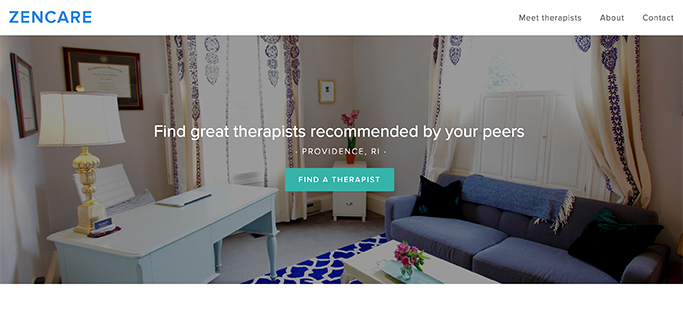Yuri Tomikawa ’12 found herself on the phone with psychologist after psychologist in Providence, asking questions about appointment times, insurance, and therapy strategies. She was not in Providence, however, but in New York City, where she was working as a business analyst. Tomikawa was searching for therapists not for herself, but for friends and acquaintances.
“Yuri was a one-woman concierge service,” says Debbie Lai ’12, a manager for Google’s strategy and policy teams. “Someone would call and say, ‘These are the things I’m looking for in a therapist,’ then Yuri would spend the entire day coming up with a comprehensive list of every therapist who fit their criteria, personally calling and interviewing each one of them, and setting up appointment times. It took a day per patient.”
At the same time, Nick Lemme MD’18 and Ben Johnston PhD, MD’18 were in the psych block of their first year at Alpert Medical School. “We were disappointed by the limits on access to care, and the standards for the quality of care,” Johnston says. “In addition, the ability to check in with your therapist or psychologist was not very good.”
“During those months, a lot of very public psychological emergencies were happening on different college campuses,” Lemme says. “That also gave us that extra push we needed to say that access to mental health care is a huge problem, and it’s one we needed to help solve.”
That lack of access is a national trend. According to the Bureau of Labor Statistics, 89.3 million Americans live in federally designated mental health professional shortage areas, compared to 55.3 million Americans living in similarly designated primary-care shortage areas.
Independently of each other, the two groups began trying to create better way to connect patients to therapists. Lemme, Johnston, and Ben Williams ’16 were working on creating an app. Tomikawa and Lai tried to solve the problem with a website. In March, the two groups found out about each others’ work and decided to collaborate, dubbing the project Zencare, with Tomikawa and Lai as co-founders and Johnston, Lemme, Williams, and Eliza Lanzillo ’16 as student advisers.
Zencare is Yelp meets online dating. The therapists listed all have been referred by people affiliated with Brown, including students, faculty, and alumni. Each therapist makes a short video in which they introduce themselves and talk about their interests and therapy methods. If the viewer is interested, they can schedule a time online for a phone consultation prior to booking an in-person appointment.
“How many other services do you book online right now?” Tomikawa says. “You order food online, you book hotels online, you schedule your masseuse online, and you register for your yoga class online.”
Tomikawa and Lai say that the phone consultation is key. “So often people go to see a therapist in person, only to realize within the first five minutes this isn’t a good match,” Tomikawa says. The phone consultation allows people to discover this without a copay, without trekking to an office, and without needing to sit through the rest of an hour-long appointment. The phone consultation also allows people to connect to many therapists over a short span of time.
And when someone is in crisis, the minutes matter. “By the time someone finds a therapist who fits, the crisis that they’re in is kind of over but not really dealt with,” Lemme says.
Right now, Zencare only lists Providence-area therapists, but eventually the team hopes to expand to provide personalized recommendations in all sorts of communities. For instance, there could be a Zencare network specifically for Google employees, or for other college campuses.
“We want to make finding a great therapist simple,” Tomikawa says. “So many people, when faced with calling several therapists, waiting to hear back from them, and then scheduling several appointments, just give up. If you can see that a therapist can talk to you for 10 minutes tonight or tomorrow night, that confidence goes a long way.”





